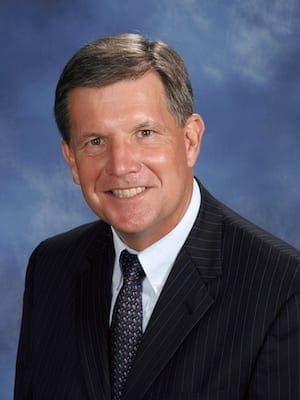I had the privilege of serving in two distinguished military communities during my years as a pastor.
And I continue to share life with those who currently serve or have valiantly served our country.
In recent days, I have enjoyed conversations with multiple military chaplains, I have officiated a wedding for a naval aviator, I have presided over the memorial service of a World War II veteran, and I have listened to the career story of a former navy pilot, now in his 80s.
But I also serve in a community where an extraordinarily large number of residents have lost a son, daughter, father, mother, brother, sister, friend or neighbor on the field of battle.
Over the past year, I have shared eulogies at more than a dozen memorial services for veterans or their family members at the Barrancas National Cemetery at the Pensacola Naval Air Station, where more than 32,000 are interred.
No one knows for sure the exact number of men and women who have lost their lives in service of the United States, but most veterans’ service agencies agree the number is 1.2 million or higher.
For this reason, Memorial Day has always evoked in me more of a sense of somber observance than of celebration.
On this one weekend of the year, in the words of Aaron Kilbourne, “The dead soldier’s silence sings our national anthem.”
Although the final Monday in May can often become a holiday marking the beginning of summer, we should be careful that the meaning of this day does not become lost in the busyness of our activities.
Memorial Day is not just another day off from work but a day to remember those who have lost their lives in the military service of our country.
In a culture that is increasingly attention-deficient, remembering is an uncomfortable but necessary discipline.
Rather than glorifying war, revisiting a few significant stories from the battlefield may keep us consciously aware of the harsh realities of war.
As we remember the fallen, we keep alive the individual and corporate legacies of valor and courage, inspiring stories that challenge us to be responsible citizens of the free world.
A nation that fails to remember the sacrifices of those who came before us will inevitably succumb to a convenient amnesia, a loss of corporate memory that eventually robs succeeding generations of acquaintance with our national heritage.
To fail to remember creates a contagious apathy that leads to a neglect of both our freedom and our citizenship.
To fail to remember can produce a false sense of security and an inaccurate perception that we are exempt from future warfare.
If for no other reason, we should remember in order to guard against what George Washington called “the impostures of pretended patriotism.”
Perhaps our virtual-reality world is becoming too much of a fantasy world. When we mute the self-serving and accusative political rhetoric, remembering our unabridged heritage can stir in us both a gut check and a reality check.
The kind of remembering we need to do on Memorial Day is an uncomfortable but necessary discipline, a practice that forges vision from memory and distills wisdom from history.
We are a privileged people. President Eisenhower proposed, “A people that values its privileges above its principles soon loses both.” Never forget the sacrifices that paved the way for our freedom and our privilege.
As we observe Memorial Day, let us take time to remember the women and men who served with extraordinary courage to establish and preserve our freedom. We have more than a million reasons to remember.
By remembering our history, may we be better prepared to engage the enemies of our day with the weapons of peace, not war.
Barry Howard serves as leadership coach / consultant with the Center for Healthy Churches and is an EthicsDaily.com board member. He lives in Pensacola, Florida. You can follow him on Twitter @BarrysNotes.
Pastor at the Wieuca Road Baptist Church in Atlanta. He also serves as a leadership coach and columnist for the Center for Healthy Churches. He and his wife, Amanda, live in Brookhaven, Georgia.

